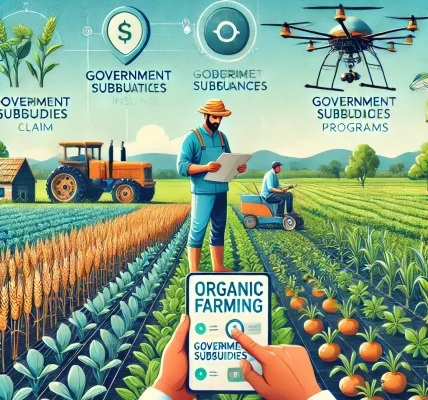Introduction
Agriculture is the backbone of many economies, but one of its biggest challenges is post-harvest losses due to inadequate storage facilities. Farmers often face huge losses because perishable commodities such as fruits, vegetables, dairy, and pulses do not have proper storage and warehousing solutions. To address this, governments have launched Cold Storage and Warehousing Schemes to help farmers preserve their produce and ensure better market prices.
In this blog, we explore the top government cold storage schemes, how they help farmers, and how to apply for them without an agent.
1. Importance of Cold Storage and Warehousing
- Prevents Post-Harvest Losses: Reduces spoilage of perishable goods like fruits, vegetables, dairy, and meat.
- Ensures Better Prices: Farmers can store their produce and sell it when market prices are higher.
- Reduces Food Waste: Proper storage facilities ensure food security and sustainability.
- Enhances Export Potential: High-quality storage helps in maintaining international standards for exports.
- Supports Value Addition: Stored produce can be used for food processing industries, increasing income.
2. Key Government Schemes for Cold Storage and Warehousing
a) Agriculture Infrastructure Fund (AIF)
- Provides subsidized loans for building cold storage, warehouses, and supply chain infrastructure.
- Farmers, cooperatives, FPOs (Farmer Producer Organizations), and agribusiness companies can apply.
- Offers 3% interest subsidy on loans up to ₹2 crores.
b) Pradhan Mantri Kisan Sampada Yojana (PMKSY)
- Aims to create modern cold storage chains.
- Provides financial assistance of up to 50% for general category beneficiaries and 75% for SC/ST farmers.
- Supports mega food parks, processing units, and warehouse infrastructure.
c) National Horticulture Board (NHB) Cold Storage Scheme
- Provides a credit-linked back-ended subsidy of 35-50% for cold storage units.
- Encourages scientific storage and preservation of perishable commodities.
- Helps farmers with market linkages and improved profitability.
d) Rashtriya Krishi Vikas Yojana (RKVY)
- Provides financial grants for state-specific cold storage and warehouse infrastructure.
- Encourages modernization of storage facilities.
- Funds new and existing storage units to improve agricultural efficiency.
e) Warehousing Development and Regulatory Authority (WDRA) Scheme
- Helps farmers get warehouse receipts, which can be used as collateral for loans.
- Ensures scientific storage and reduces dependency on middlemen.
- Promotes rural storage facilities to support small farmers.
3. How to Apply for These Schemes Without an Agent?
Farmers can apply directly through government portals without paying fees to agents.
Step 1: Check Eligibility
- Should be an individual farmer, FPO, cooperative society, or agribusiness company.
- Must have land ownership or lease agreement for storage facility construction.
- Should meet scheme-specific minimum and maximum investment criteria.
Step 2: Gather Required Documents
- Land ownership papers
- Aadhaar Card & PAN Card
- Bank account details
- Project report for cold storage setup
- Cost estimation and financial viability report
Step 3: Apply Online
- Visit government portals such as:
- https://agricoop.nic.in (Ministry of Agriculture)
- State agriculture department websites
- National Horticulture Board (NHB) official website
- Fill in the application form with accurate details.
- Upload the necessary documents.
- Submit and track the status online.
Step 4: Offline Application Process
- Visit the nearest Krishi Vigyan Kendra (KVK) or Agriculture Office.
- Collect and fill out the application form.
- Submit documents and get an acknowledgment receipt.
- Follow up with the concerned authorities for approval.
4. Benefits of Cold Storage and Warehousing Schemes
- Financial Assistance: Reduces the cost of setting up storage units.
- Improved Market Access: Farmers can sell their produce at the right time.
- Reduction in Middlemen Exploitation: Farmers gain more control over pricing.
- Increased Shelf Life: Prevents crop spoilage and ensures food security.
- Loan Access: Warehouse receipts can be used as collateral for farm credit.
5. Legal Precautions to Avoid Fraud
- Apply only through official government websites to prevent scams.
- Do not pay unauthorized fees to middlemen or agents.
- Verify approvals and disbursement details before making financial commitments.
- Keep copies of all application forms, receipts, and approvals.
Conclusion
Cold storage and warehousing are essential to reducing post-harvest losses and improving farmers’ income. With government schemes such as AIF, PMKSY, and NHB subsidies, farmers can build modern storage facilities at reduced costs.
By applying directly through official portals, farmers can maximize benefits without agent fees, ensuring higher profitability and long-term sustainability.
Are you ready to upgrade your storage facilities? Apply for government schemes today and secure your farm’s future! 🚜❄️




